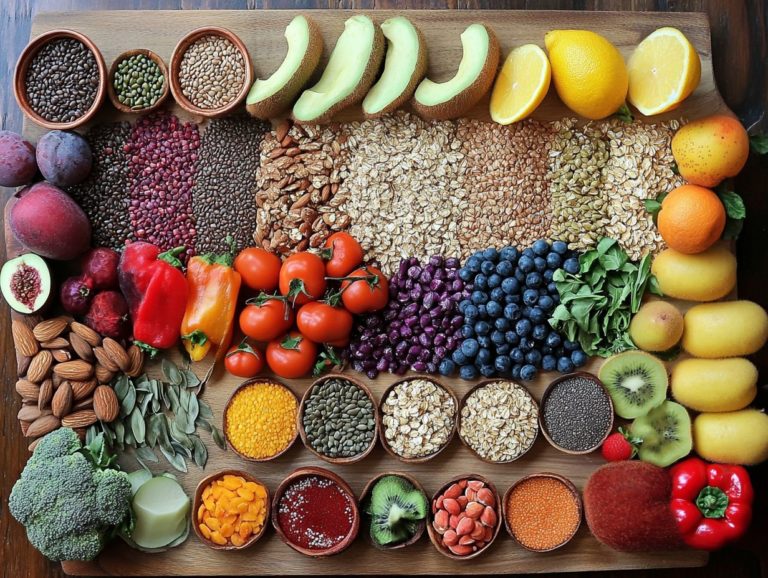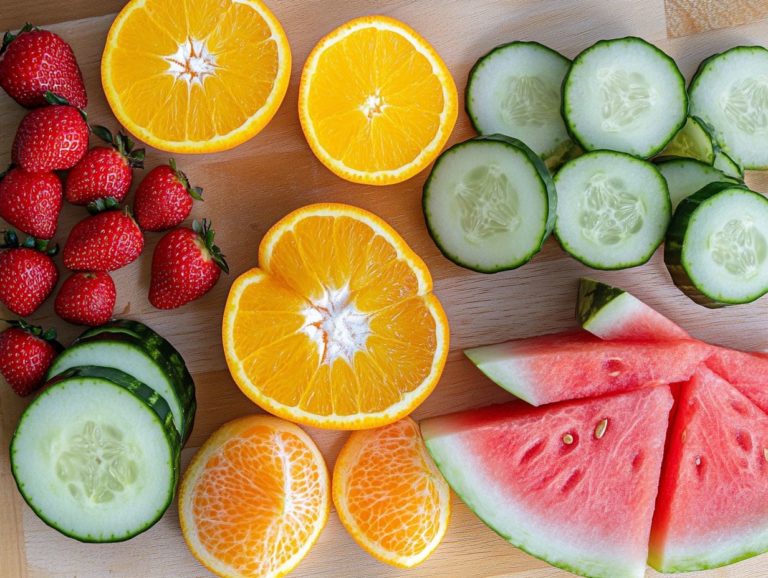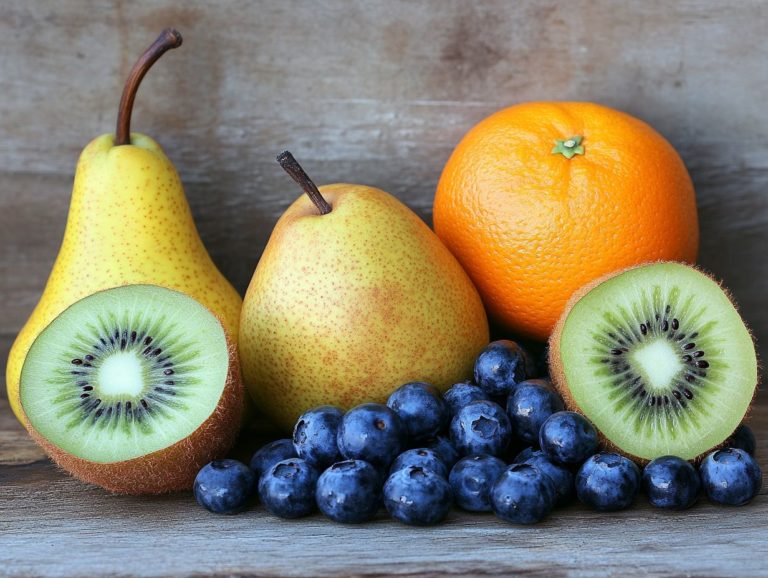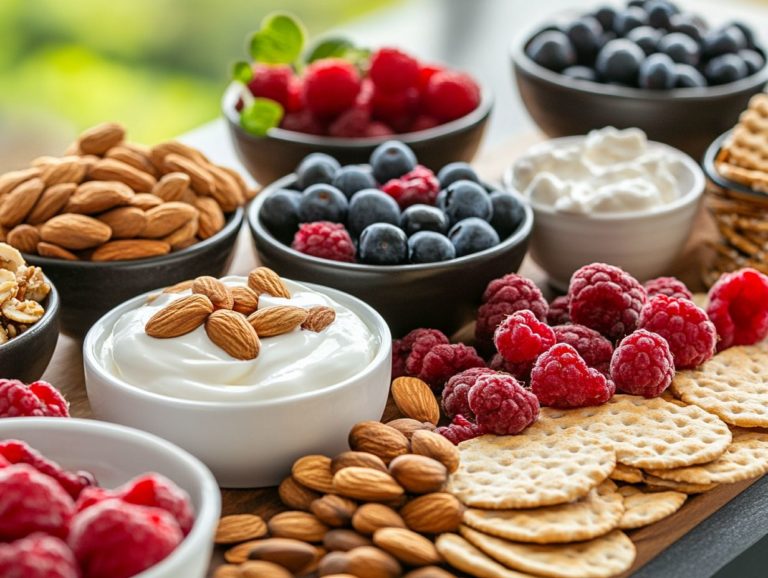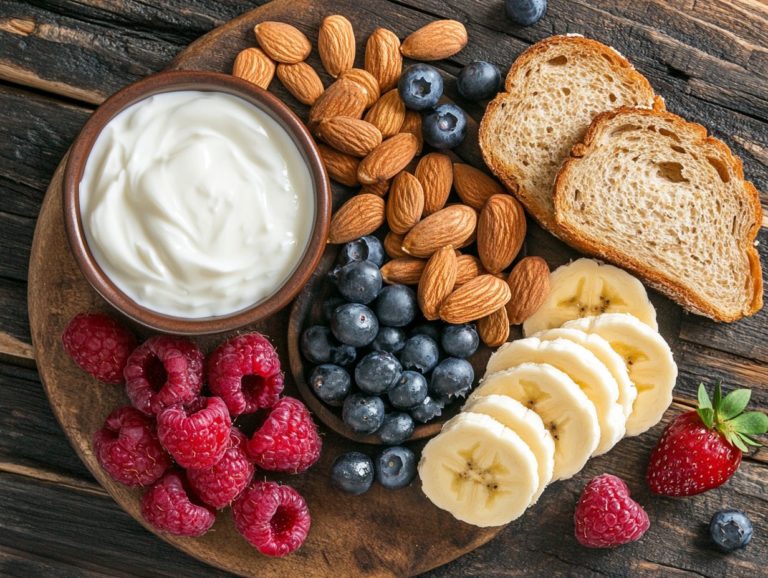Top Foods for Maintaining Healthy Blood Sugar
Understanding blood sugar is essential for your overall health. It significantly influences your energy levels, mood, and long-term well-being.
This article explores the concept of blood sugar and highlights the importance of maintaining healthy levels. You’ll learn which foods to avoid to prevent frustrating spikes and crashes, as well as the top choices that can help stabilize your blood sugar.
Lifestyle factors like exercise and stress management are critical for a holistic approach to health.
Jump in now to discover exciting tips that will empower you to take charge of your blood sugar!
Contents
- Key Takeaways:
- Understanding Blood Sugar and Its Importance
- Foods to Avoid for Stable Blood Sugar
- Top Foods for Maintaining Healthy Blood Sugar
- Incorporating These Foods into Your Diet
- Other Lifestyle Factors for Managing Blood Sugar
- Frequently Asked Questions
- What are the top foods for maintaining healthy blood sugar?
- Why are leafy greens important for managing blood sugar?
- What are some examples of whole grains that can help maintain healthy blood sugar?
- How does lean protein benefit blood sugar levels?
- What role do healthy fats play in managing blood sugar?
- Can fruits be included in a blood sugar-friendly diet?
Key Takeaways:
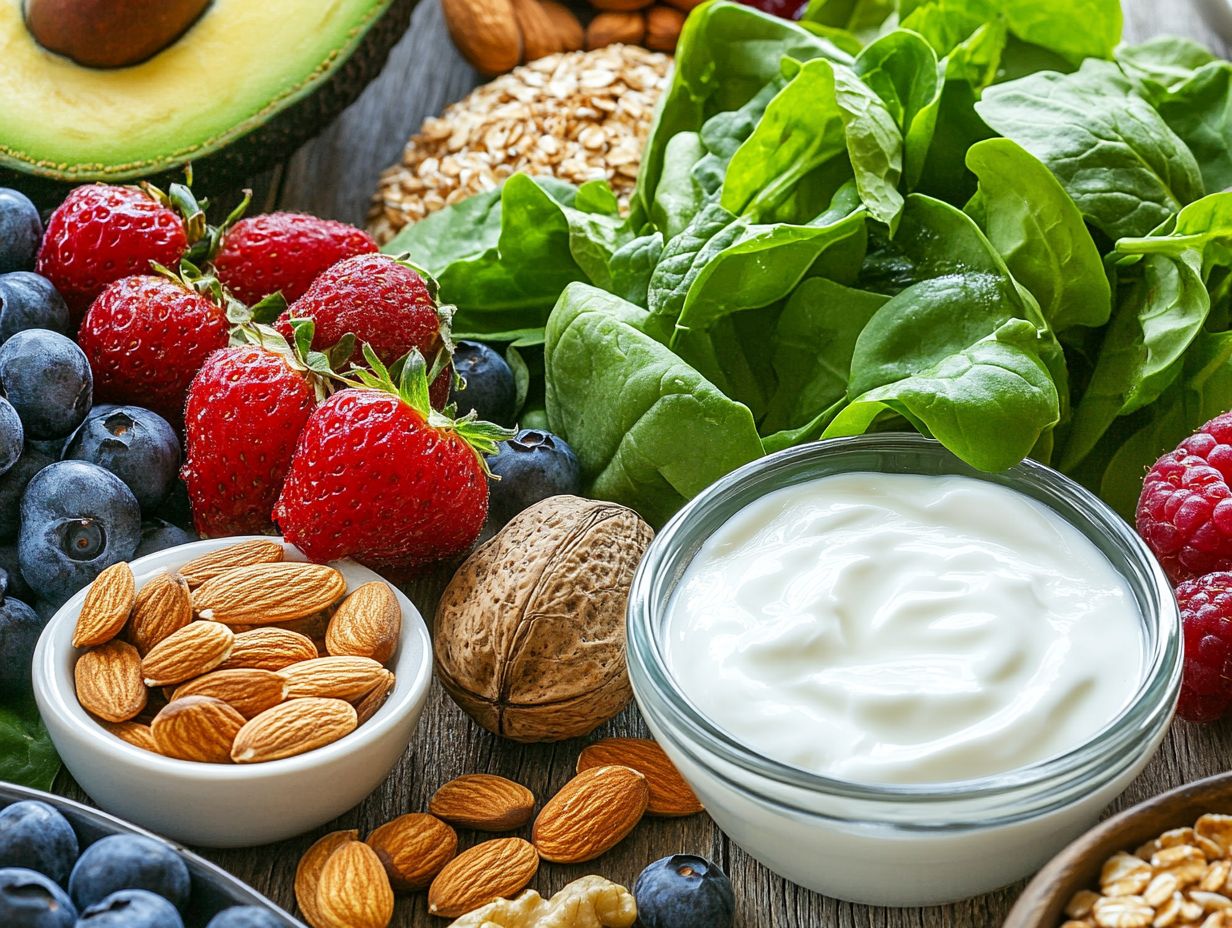
- Eat whole grains and complex carbohydrates to maintain healthy blood sugar levels. These foods are high in fiber and take longer to digest, preventing spikes.
- Incorporate lean proteins and healthy fats into your diet. They can slow digestion and help keep blood sugar levels stable.
- Choose fruits and vegetables with a low glycemic index, which is a measure of how quickly foods raise blood sugar levels. These nutrient-dense foods won t cause sharp increases in blood sugar.
Understanding Blood Sugar and Its Importance
Understanding blood sugar is vital for your overall health, especially if you re at risk for type 2 diabetes or have already been diagnosed. Blood sugar, or blood glucose, refers to the amount of sugar in your blood, primarily sourced from carbohydrates in your diet.
To manage your blood sugar effectively, focus on a nutritious diet that includes balanced food choices rich in soluble fiber, lean proteins, and healthy fats. These elements help regulate your blood sugar levels and enhance how well your body’s cells respond to insulin.
If you don t maintain stable levels, you may face fluctuations that could increase your risk of chronic diseases.
What is Blood Sugar?
Blood sugar, or blood glucose, serves as a vital source of energy for your body’s cells and is meticulously regulated by insulin produced by the pancreas.
This glucose primarily comes from the foods you consume, particularly carbohydrates, which your body breaks down into simple sugars during digestion.
When glucose enters your bloodstream, levels rise, prompting the pancreas to release insulin a hormone essential for maintaining balance. Insulin plays a critical role in facilitating glucose uptake by your cells, ensuring they have the energy needed for various functions.
However, when glucose levels swing too high or too low, serious health implications can arise, potentially leading to conditions like diabetes or hypoglycemia. Understanding the dynamics of blood sugar is crucial for effectively managing your overall health.
Why is it Important to Maintain Healthy Levels?
Maintaining healthy blood sugar levels is essential for your overall well-being. It significantly reduces the risk of developing type 2 diabetes and other chronic diseases. Numerous studies show that stable blood sugar contributes to improved insulin sensitivity, which is crucial for metabolic health.
When your blood sugar levels remain consistently high, your body may struggle to respond effectively to insulin, resulting in increased insulin resistance and a range of health complications. On the flip side, low blood sugar can lead to symptoms like fatigue and irritability, impacting your daily life.
Research underscores a strong link between poor glycemic control and an increased likelihood of developing cardiovascular diseases. To promote better blood sugar management, dietary recommendations often suggest a balanced intake of:
- Whole grains
- Lean proteins
- Plenty of fruits and vegetables
Pairing this with regular physical activity can help stabilize your blood sugar levels and enhance your overall health outcomes.
Foods to Avoid for Stable Blood Sugar
To maintain stable blood sugar levels, it is crucial to be aware of the foods you consume, especially those that can trigger spikes or fluctuations.
Making informed choices will help you achieve a balanced lifestyle and promote overall well-being.
Take charge of your health today! Start making small changes to your diet and lifestyle to maintain healthy blood sugar levels.
High Glycemic Index Foods to Limit
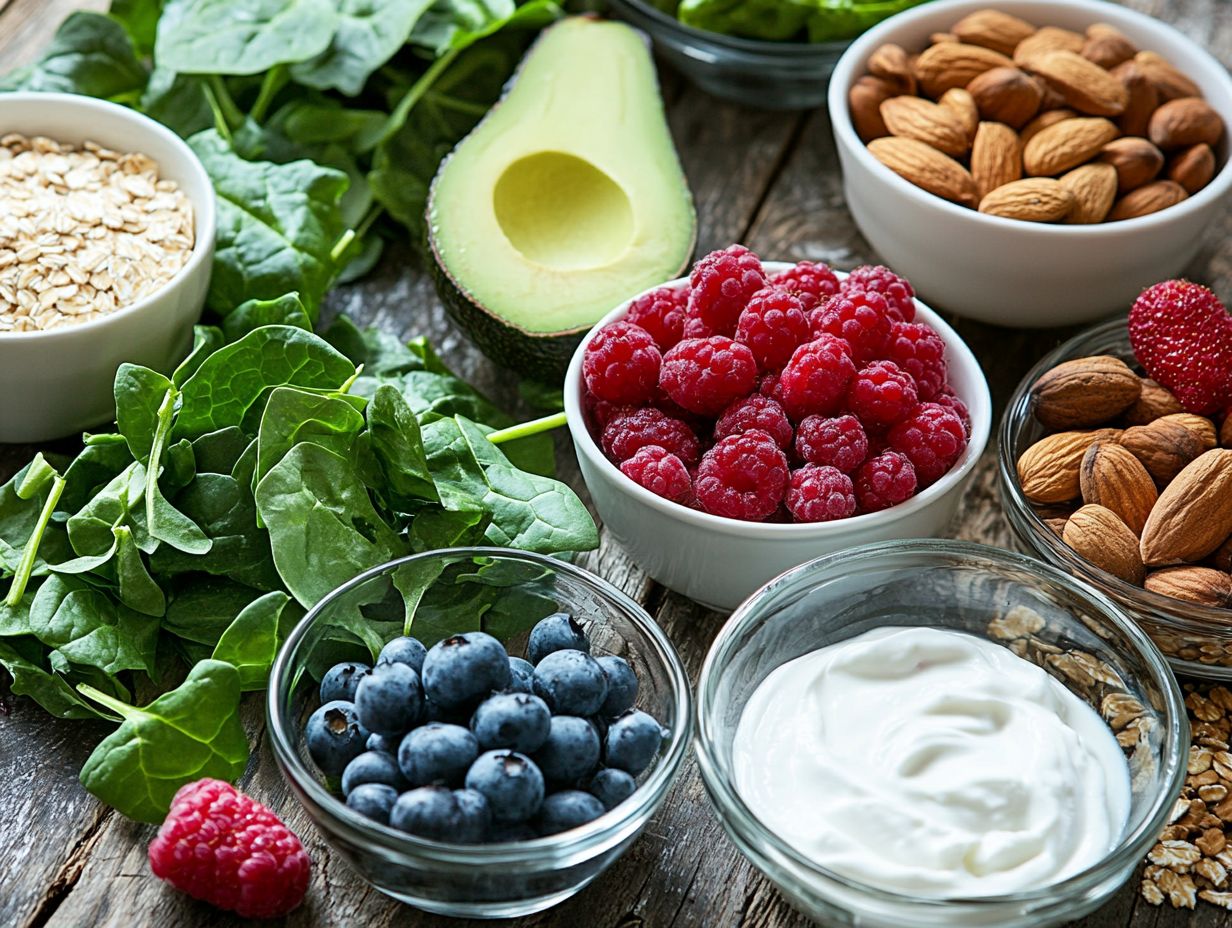
High glycemic index (GI) foods can trigger rapid spikes in your blood sugar levels. Therefore, it’s essential to limit their consumption to achieve better blood sugar control.
Think about those high GI foods like white bread, sugary snacks, and certain breakfast cereals. They can give you a quick energy boost, but they’re often followed by a swift crash, leaving you fatigued and reaching for more food sooner than you’d like.
Understanding the glycemic index a scale that ranks foods based on how they affect blood sugar levels is crucial for making informed dietary choices. It allows you to steer clear of foods that can disrupt your insulin response, leading to more stable blood sugar levels over time.
Opting for lower GI options such as whole grains, legumes, and most fruits and vegetables can provide sustained energy throughout the day while reducing your risk of chronic health issues.
Processed and Sugary Foods to Avoid
Processed and sugary foods present significant obstacles to effective blood sugar management. It’s crucial to avoid these foods now to protect your health. They can trigger rapid spikes and crashes in your blood sugar levels, potentially leading to long-term health complications like insulin resistance and type 2 diabetes.
If you’re aiming to maintain stable blood sugar, consider incorporating whole grains, legumes, and an abundance of vegetables into your meals. Choosing natural sweeteners like honey or maple syrup in moderation can also be a savvy move.
By watching your portion sizes closely, you can take charge of your health! This approach not only fosters balance in your eating habits but also enhances your overall well-being.
Top Foods for Maintaining Healthy Blood Sugar
Incorporating a diverse array of foods rich in nutrients into your diet is vital for maintaining optimal blood sugar levels. By thoughtfully selecting your meals, you can support your body s needs and promote a balanced, vibrant lifestyle.
Whole Grains and Complex Carbohydrates
Whole grains and complex carbohydrates are essential elements of a healthy diet. They can significantly assist you in maintaining stable blood sugar levels. These foods are rich in fiber and low on the glycemic index, providing a steady release of glucose into your bloodstream.
This steady release minimizes those frustrating spikes and crashes that often lead to cravings and fatigue. When you choose options like quinoa, brown rice, and whole oats, you’re not just sustaining your energy throughout the day; you re also nourishing your body with essential vitamins and minerals.
For example, quinoa stands out as a complete protein, boasting all nine essential amino acids. Brown rice delivers vital B vitamins that support your metabolism.
By incorporating these foods into your meals, you can effectively manage your blood sugar levels and promote your overall health.
Lean Proteins and Healthy Fats
Incorporating lean proteins and healthy fats into your meals can significantly enhance your blood sugar management. These nutrients are essential for regulating blood glucose levels, providing sustained energy and stabilizing insulin responses.
Lean proteins like chicken, fish, and legumes not only keep you feeling full but also support muscle maintenance crucial for maintaining metabolic balance. Healthy fats found in avocados, nuts, and olive oil can help your body respond better to insulin, making it easier for your body to manage blood sugar levels effectively.
To seamlessly integrate these components into your diet, consider adding:
- Grilled chicken to a fresh salad
- Sprinkling nuts over your oatmeal
- Utilizing olive oil as a base for your homemade dressings
These straightforward additions can transform your meals into more balanced options and promote better overall health.
Evaluate your eating habits today and consult a nutritionist for personalized advice!
Fruits and Vegetables with Low Glycemic Index
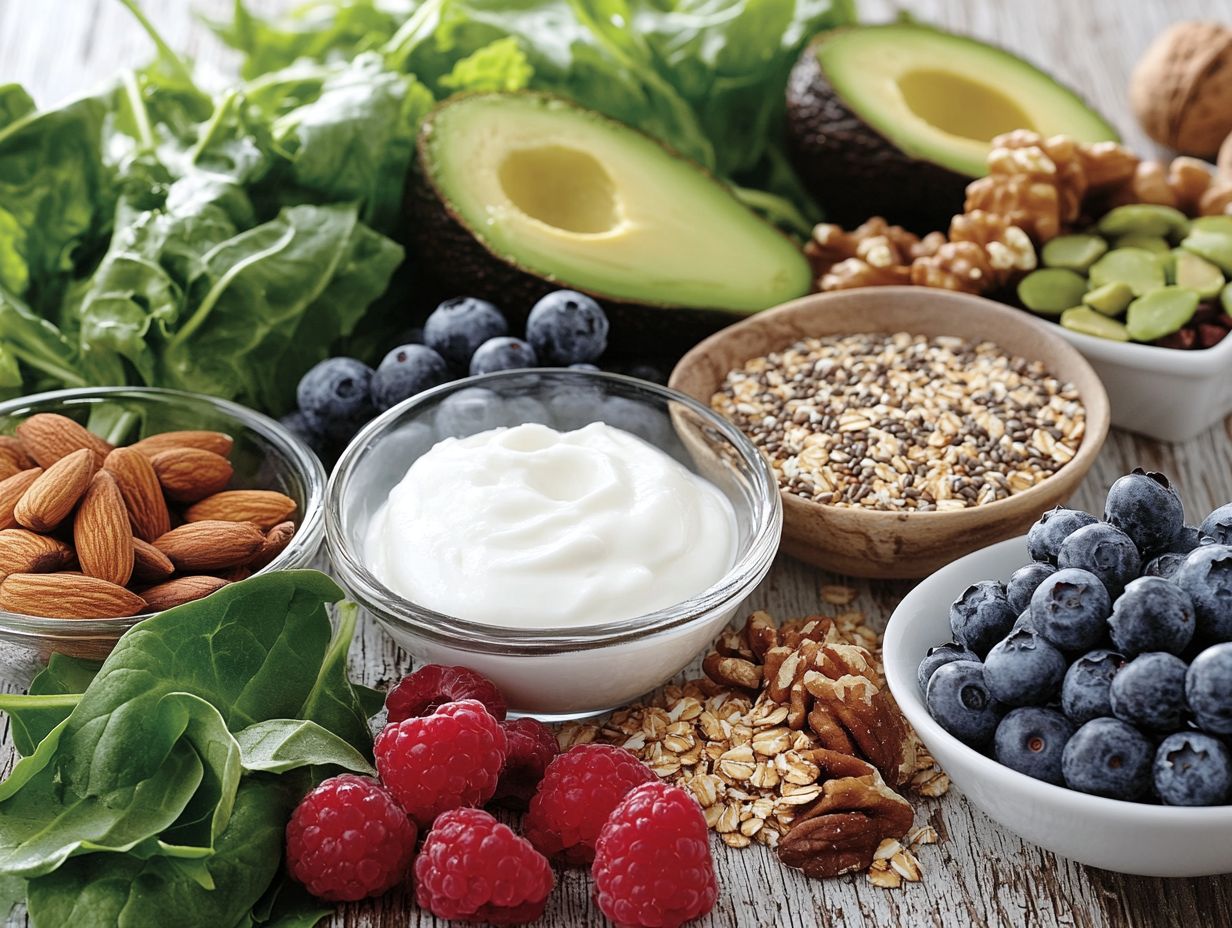
Fruits and vegetables with a low glycemic index are vital for maintaining healthy blood sugar levels. They deliver a wealth of essential nutrients and antioxidants.
Incorporating foods like berries, apples, and cherries helps elevate your overall health. Vegetables such as spinach, carrots, and sweet potatoes are also great choices.
These low GI options are rich in fiber, which supports digestion and helps regulate blood sugar spikes. They also contain important vitamins like A and C, along with potent antioxidants that combat oxidative stress.
Adding these tasty foods to your daily meals can help you create a balanced diet that boosts your energy.
Incorporating These Foods into Your Diet
Making dietary changes to include foods that promote healthy blood sugar management is crucial for your well-being. These healthy food options play a significant role in disease prevention.
Prioritizing these choices can have a positive impact on your long-term health.
Meal Planning and Recipes
Effective meal planning and delicious recipes are key to maintaining healthy blood sugar levels while keeping your diet diverse and interesting.
Focusing on nutrient-rich ingredients and balancing carbohydrates, healthy fats, and proteins allows you to enjoy satisfying meals that support your well-being.
Incorporating whole grains, leafy greens, and lean proteins helps stabilize your glucose levels, making every bite both enjoyable and beneficial.
Planning your meals in advance gives you control over portions and helps you avoid impulsive choices that may lead to blood sugar spikes.
Getting creative with meal prep like batch cooking or using seasonal produce adds excitement to your dining experience while enhancing your nutrition strategy.
Other Lifestyle Factors for Managing Blood Sugar
Managing blood sugar levels involves more than just diet. Other lifestyle factors, such as exercise and stress management, are crucial for comprehensive blood sugar control.
Incorporating these elements into your routine creates a balanced approach that enhances your overall well-being.
Exercise and Stress Management
Regular exercise and effective stress management are essential parts of a healthy lifestyle that can help stabilize blood sugar fluctuations.
Engaging in physical activities like brisk walking, cycling, or yoga not only boosts your fitness but also elevates your mood and promotes relaxation.
For those managing blood sugar levels, aiming for at least 150 minutes of moderate exercise each week can yield significant benefits.
Combining this with mindfulness techniques like meditation or deep breathing helps maintain emotional balance and reduces stress-induced spikes in blood sugar.
Finding activities you enjoy, such as dancing, swimming, or group classes, makes it easier to sustain these practices.
Embracing these habits gradually paves the way for lasting, positive changes in your daily life.
Frequently Asked Questions
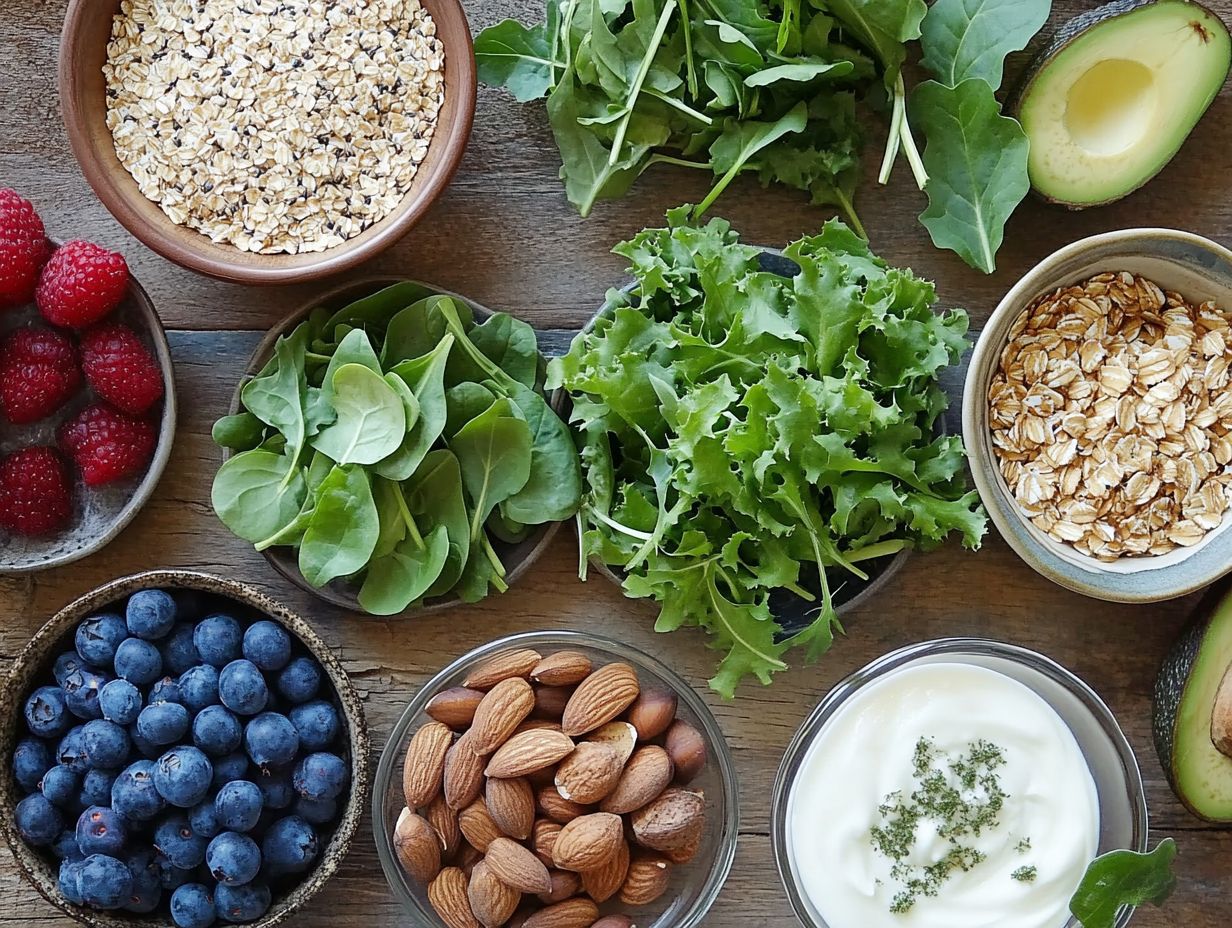
What are the top foods for maintaining healthy blood sugar?
The top foods for maintaining healthy blood sugar levels include leafy greens, whole grains, lean protein, healthy fats, and low glycemic index fruits.
Why are leafy greens important for managing blood sugar?
Leafy greens are high in fiber and low in calories, which helps regulate blood sugar levels and promote satiety.
What are some examples of whole grains that can help maintain healthy blood sugar?
Whole grains like brown rice, quinoa, and oats are excellent options as they are high in fiber and have a lower glycemic index than refined grains.
How does lean protein benefit blood sugar levels?
Lean proteins like chicken, fish, and tofu help keep blood sugar steady by slowing down how quickly glucose enters the bloodstream.
Start incorporating low GI foods into your meals today for better health!
What role do healthy fats play in managing blood sugar?
Healthy fats are crucial for your health. Foods like avocados, nuts, and olive oil boost insulin sensitivity and help keep blood sugar levels stable.
Can fruits be included in a blood sugar-friendly diet?
Absolutely! You can enjoy low glycemic index fruits such as berries, apples, and citrus fruits to help manage your blood sugar effectively.

